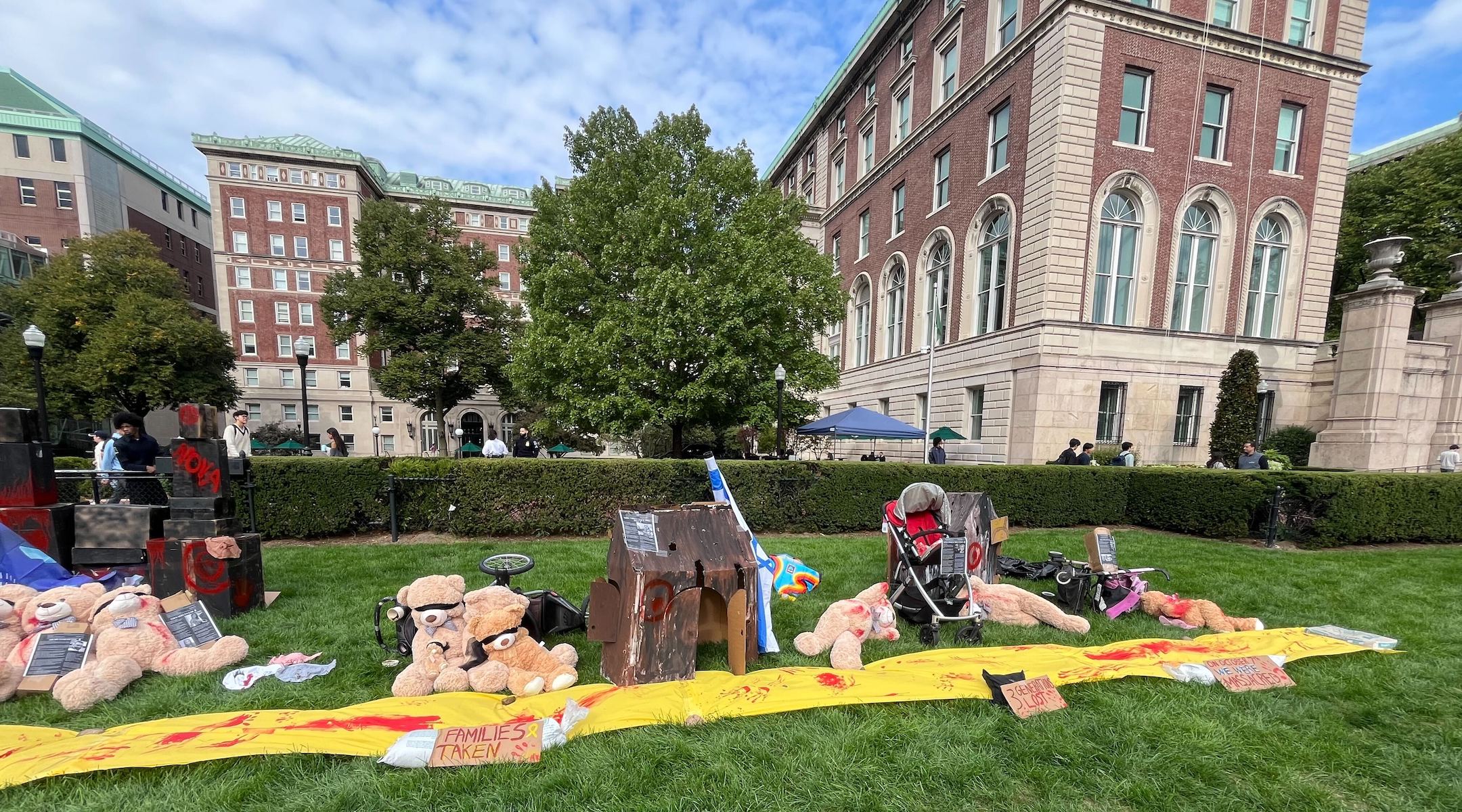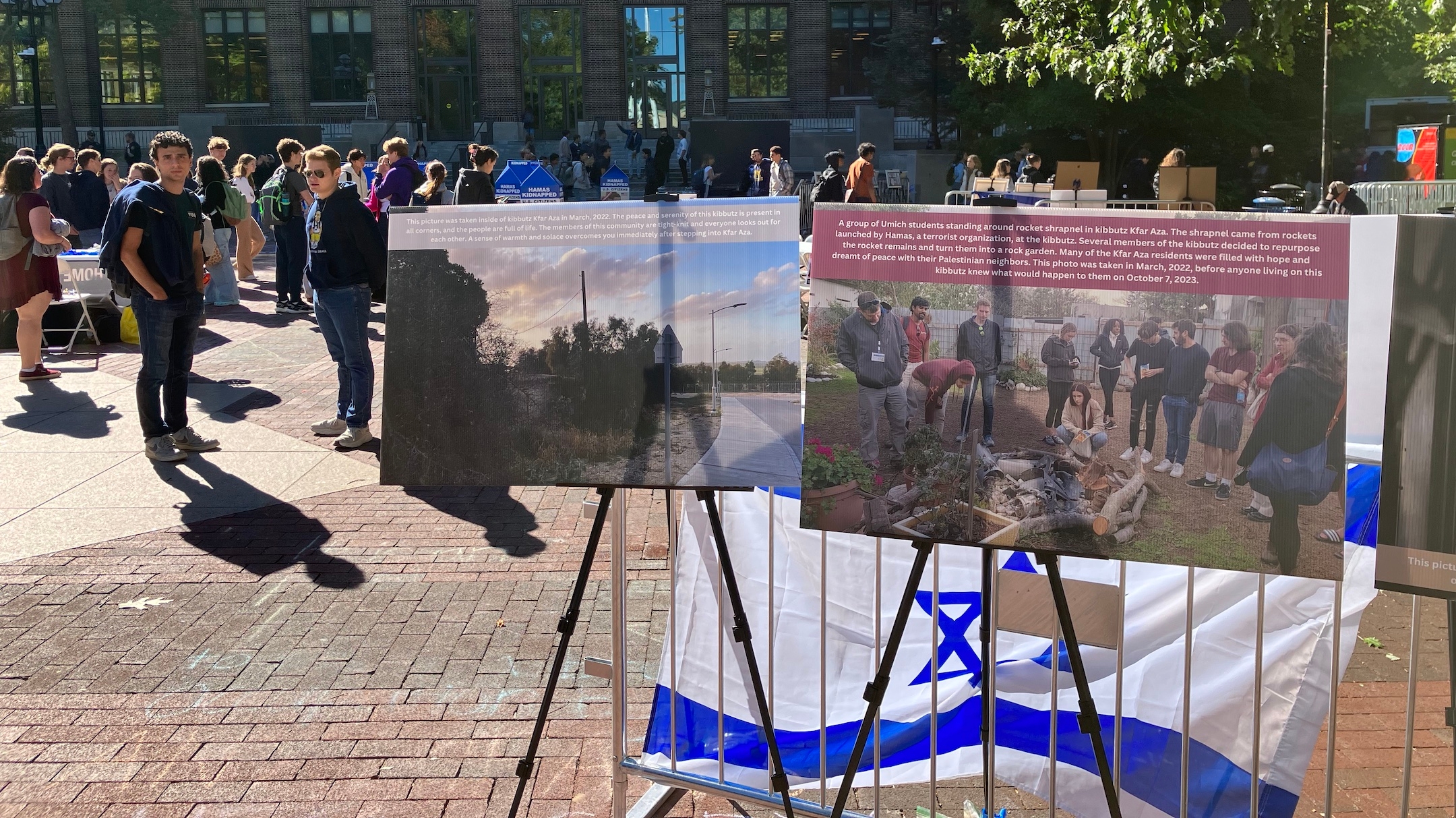ANN ARBOR, Michigan — On the one-year anniversary of Hamas’ deadly invasion of Israel, the University of Michigan’s campus was adorned with Israeli and American flags, creating a pro-Israel display that had been planned for months.
Meanwhile, on a nearby lawn, the graduate student union organized a “walkout for Gaza” that avoided the pro-Israel demonstration. Additionally, a Jewish community vigil was held on the campus to mourn the victims of the attack, while pro-Palestinian student groups hosted an event titled “Debunking Zionist Myths” at a secret location.
Unlike the confrontations that occurred in the spring, the events on campus this time coexisted peacefully. Last spring, pro-Palestinian activists set up an encampment on the campus Diag to protest Israel’s actions in Gaza, which Jewish students and groups criticized as antisemitic. The university administration intervened and has since taken steps to prevent disruptive protests on campus.
Despite increased enforcement, tensions surrounding Israel at Michigan have persisted this semester, making the subdued atmosphere on the Diag a rare moment of calm. The day saw a disturbing incident where a Detroit-area house owned by university president Santa Ono was defaced with graffiti associated with Hamas. This act, along with other instances of antisemitism and activism on campus, has added to the ongoing tension.
The campus has been a hotspot for activism and conflict, with incidents ranging from vandalism to physical threats against Jewish students. The situation has prompted some Jewish students to consider forming a volunteer safety brigade for protection.
The memorial display on the Diag was intended to be a place of remembrance rather than a platform for political advocacy. It featured Israeli and American flags, spaces for prayer, and photographs from the war that portrayed the suffering on all sides.
While the day was marked by various demonstrations and events at colleges across the U.S., administrators at some universities took preemptive measures to prevent disruptive protests. The University of Maryland, for example, initially revoked a permit for a pro-Palestinian rally before being ordered by a judge to allow it. Tufts University suspended its Students for Justice in Palestine chapter for policy violations related to protest activities.
Despite concerns of potential clashes, most campuses experienced multiple demonstrations with minimal disruptions. Memorial vigils organized by Jewish groups proceeded peacefully, while pro-Palestinian students staged their own rallies.
At Columbia University, where tensions have been high, both Jewish advocates and pro-Palestinian students held separate events on the anniversary. The day passed without major conflicts, signaling a shift from the confrontations seen in the past.

A display of teddy bears on Columbia’s campus on Oct. 7, 2024 meant to symbolize Israelis killed and taken hostage one year earlier. (Courtesy Yakira Galler)
At Michigan, efforts were made to ensure a peaceful commemoration on Oct. 7, with the central space reserved for the memorial event. Security was tight, and the day passed without major disruptions, allowing students of all backgrounds to pay their respects.
The event was a collaboration between various Jewish and pro-Israel groups on campus, aiming to honor the victims of the conflict on both sides. Despite challenges leading up to the event, the day unfolded smoothly, providing an opportunity for the community to come together in remembrance.
As tensions persist on college campuses regarding Israel and Palestine, the anniversary served as a somber reminder of the ongoing divisions and challenges faced by students. While the day was marked by peaceful commemorations, the underlying conflicts and activism continue to create a tense atmosphere on campus.

Students participate in a display marking the anniversary of Hamas’ Oct. 7, 2023, attack on Israel at the University of Michigan, Oct. 7, 2024. (Andrew Lapin)
The anniversary events served as a reflection of the complex dynamics and ongoing tensions surrounding Israel and Palestine on college campuses, highlighting the need for dialogue, understanding, and a commitment to peaceful coexistence.
Support the Jewish Telegraphic Agency
Help ensure Jewish news remains accessible to all. Your donation to the Jewish Telegraphic Agency powers the trusted journalism that has connected Jewish communities worldwide for more than 100 years. With your help, JTA can continue to deliver vital news and insights. Donate today.
